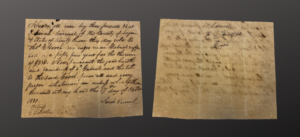Pitts Theology Library recently acquired a bill of sale recording the 1831 purchase of an enslaved person by a Methodist minister. Records like this illuminate the harsh realities of the slave trade in America, and they provide personal details that help us understand more concretely the people involved in and affected by the horrors of the slave trade. In this bill of sale, dated October 17, 1831, a certain Sarah Carneal of Logan County, Kentucky, records her sale of an enslaved man named Gabriel, of “supposed age fifty five years for the sum of $230.” The receipt indicates Gabriel was sold to Thomas G. Gooch (1800–1874), who is documented to have been a Methodist minister in Logan County, Kentucky, licensed to preach in 1823 and ordained as a deacon in 1839.

Despite John Wesley’s opposition to slavery, Methodists in America were divided over the issue. In the 1830s and 1840s, slavery was debated extensively within the Methodist Episcopal Church, and in 1844, the church split over the issue of slavery, after it became publicly known that James Osgood Andrew (1794-1871), a bishop from Georgia, owned enslaved persons. This particular bill of sale stands as a stark reminder of the reality of slave ownership within the Methodist Episcopal Church, and it compels Christians to consider how significant a role the church and its leadership played in the perpetuation and expansion of this terror in America.
Find more digitized Special Collections items held by Pitts at pitts.emory.edu/collections/digitalcollections and digital.library.emory.edu!
